TABLE OF CONTENTS
MESSAGE FROM THE VETERANS OMBUD
Survivor Receives Benefits After Error Corrected
SHARING, LISTENING, AND CONNECTING
REPORTS, RECOMMENDATIONS, AND RESOURCES
Additional Dependant Care Reimbursement Under the Veterans Affairs Canada Rehabilitation Program
What To Expect When You Contact Our Office
MESSAGE FROM THE VETERANS OMBUD
This past year has been a busy one. We continued our outreach Footnote 1 across the country to meet with and hear from the Veteran community, including many stakeholders who care deeply about Canada’s Veterans and their families.
We have heard several disturbing stories about Veterans not having family doctors and the impact that has had on their well-being. One Veteran shared his predicament: his operational stress injury (OSI) clinic psychiatrist recommended a medication but he no longer had a family doctor to provide the prescription and necessary oversight, and as a result, the Veteran was unable to get the medication he sorely needed. Other Veterans have told us about family doctors or specialists refusing to fill out Veterans Affairs Canada (VAC) paperwork, which means they can’t apply for disability or even treatment benefits. These are heart-breaking stories. We continue to advocate for Veteran access to family doctors and for VAC to consider alternatives to complicated forms that require a doctor or specialist to complete.
Equally hard to hear are the stories of Veteran families who struggle with mental health issues arising from being part of a military or Royal Canadian Mounted Police (RCMP) family. One individual who has become the caregiver to her grievously injured Veteran spouse shared about how she needs mental health treatment for herself and her children as a result – beyond what the VAC Assistance Service can provide. Our January 2021 recommendation to the Minister in this regard is still outstanding and is still, if not more, pressing.
Our first online Town Hall was with a group of Survivors, primarily widows of deceased military members. I have shared their many concerns with VAC and look forward to a response that, at a minimum, will eliminate the possibility that a widow or widower receives incorrect information from VAC that impacts the benefits for which they could be eligible. We look forward to expanding our online reach to Veterans and their families.
Over my four years in this role, I have also heard from Veterans who released from the Canadian Armed Forces (CAF) before having completed twelve years of service, and who had nothing to show for their service. I shared this story with the Commander Military Personnel: a Veteran was attending an event where Veterans were being provided with a complimentary item of clothing, and when the Veteran reached out her hand to take one, the person behind the table slapped her hand and said, “Those are for Veterans only!” I was delighted to learn that the CAF will extend the eligibility for the Bronze Service Pin for CAF members releasing after having achieved their occupational functional point but with fewer than 12 years (exact details yet to be promulgated). The Service Pin is a small thing, but it is something tangible that Veterans can wear to show that they served.
Finally, and probably as a result of our outreach efforts, we have seen a notable increase in the number of complaints and requests for information we receive. This and other factors have caused us to re-imagine some elements of the way the Office is structured. But the way we do our work remains constant. Our Intervention Services Directorate analysts receive weeks of training before they can take a complaint and apply their analytical skills to ascertain whether there is unfairness in a case and then seek resolution with VAC. The handful of senior analysts delving into systemic issues, defining elements of unfairness or barriers to access, and proposing recommendations know that their efforts can make a difference in the lives of many Veterans and their families. Our Communications and Corporate Services teams are critical to the smooth running of the Office. Each one of our staff members is contributing to the essential Ombuds’ work for our Veteran community, and I remain impressed with and grateful for their dedication, their commitment and their compassion.
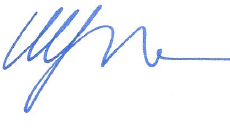
Colonel (Retired) Nishika Jardine
Veterans Ombud
Our organization consists of the following:
- Veterans Ombud
- Deputy Veterans Ombud and Executive Director
- Intervention Services Directorate
- Strategic Review and Analysis Directorate
- Communications Directorate
- Corporate Services Directorate
The Office of the Veterans Ombud (OVO) operates offices in Charlottetown, Prince Edward Island, and Ottawa, Ontario. Our team consists of 23 employees working from these office locations, alongside 12 employees who telework from various parts of Canada. In total, the OVO employed 35 employees during the 2024-2025 fiscal year.
The OVO continues to implement the hybrid work model adopted by the Federal Public Service. Since September 2024, all public servants are required to work at least three days a week in the office.
We are committed to excellence in our work, and place a high value on the insights, resources and training available through various ombuds organizations. The OVO is a proud member of the International Ombudsman Institute and the Forum of Canadian Ombudsman (FCO). Additionally, all OVO employees complete the Essentials for Ombuds training course, offered by the FCO in partnership with Osgoode Professional Development.
Land Acknowledgement
We acknowledge that the lands on which we live, work, and gather, are on the traditional territories of many Indigenous nations. Our Charlottetown office is on the unceded territory of the Mi’kmaq People who have occupied the island of Epekwitk (Prince Edward Island) for over 12,000 years. Our Ottawa office is on the unceded territory of the Anishinaabe Algonquin Nation whose presence there reaches back to time immemorial.
Education on the past and present relationship between Indigenous Peoples and the Canadian Government as well as cultural bias and Indigenous perspectives training is one part of our commitment to reconciliation. We continue to connect with members and representatives of Indigenous Veteran communities and organizations as we incorporate recommendations from the Truth and Reconciliation Commission in our work serving Veterans and their families.
Who We Are
The OVO investigates complaints and challenges the policies and decisions of Veterans Affairs Canada (VAC) where we find individual or systemic unfairness. We strive to be an independent and respected voice for fairness and a champion for the well-being of Veterans and their families.
What We Do
- We operate independently and impartially
- We listen to our clients
- We review their files and walk them through the process to their next steps
- We identify and review emerging and systemic issues related to VAC programs and services
- We facilitate client access to VAC programs and services by providing information and referrals
Our Priorities
- Building trust: Our goal is to build trust between government and veterans by ensuring that veterans and their families receive the services and benefits that they are entitled to receive from VAC.
- Creating better outcomes for the Veteran community: When we notice problems and/or gaps with VAC services and benefits, we recommend changes to improve the overall health and well-being of Veterans and their families.
- Ensuring fair and timely access: We continuously work to identify unfair, inefficient and overly complex elements in the administration of VAC programs and services.
Why Should Veterans Contact Us?
Everyone seeking or receiving services and/or benefits from VAC has the right to be treated with respect, dignity, fairness and courtesy. This is set out by VAC in the Veterans Bill of Rights. If Veterans feel any of their rights have not been upheld or a decision is unfair, they have the right to make a complaint to the Office of the Veterans Ombud.
This year, the Intervention Services Directorate received 1,848 complaints and information requests; it's the most we've received since 2019-20 and 72 more than we received last fiscal year. Despite this increase, we continue to exceed our service standard of 85% by investigating 93% of complaints within 60 working days. The information requests and complaints we receive are diverse and cover all VAC programs and services. The most common complaints we receive are about treatment benefit decisions, disability benefit decisions, and disability benefit wait times.
Intervention By The Numbers
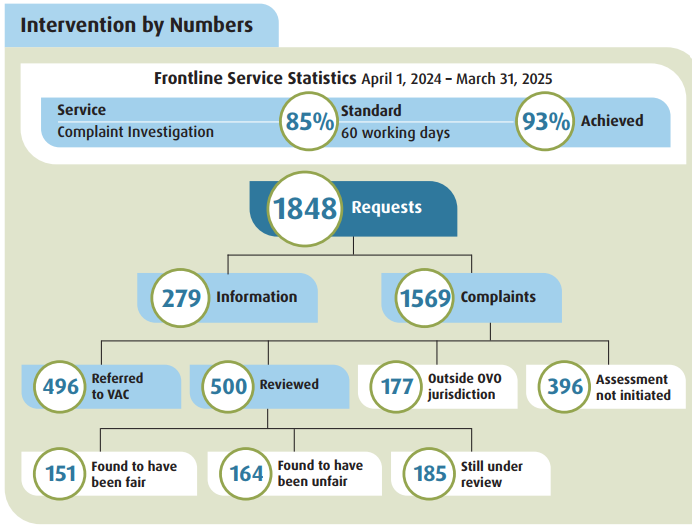
Alternative Text
Service Standard - 85% (60 working days); 93% achieved
1848 requests
1569 complaints + 279 requests for information
496 referred to VAC
500 reviewed
177 outside OVO jurisdiction
396 assessments not initiated
151 found to have been fair
164 found to have been unfair
185 still under review
Number of Complaints and Information Requests
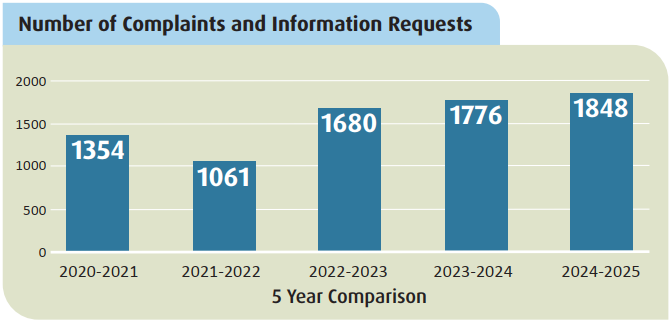
Alternative Text
5 Year Comparison
2020-2021 -1354
2021-2022 - 1061
2022-2023 - 1680
2023-2024 - 1776
2024-2025 - 1848
Client Complaints/Inquiries by Province and Territory Footnote 2
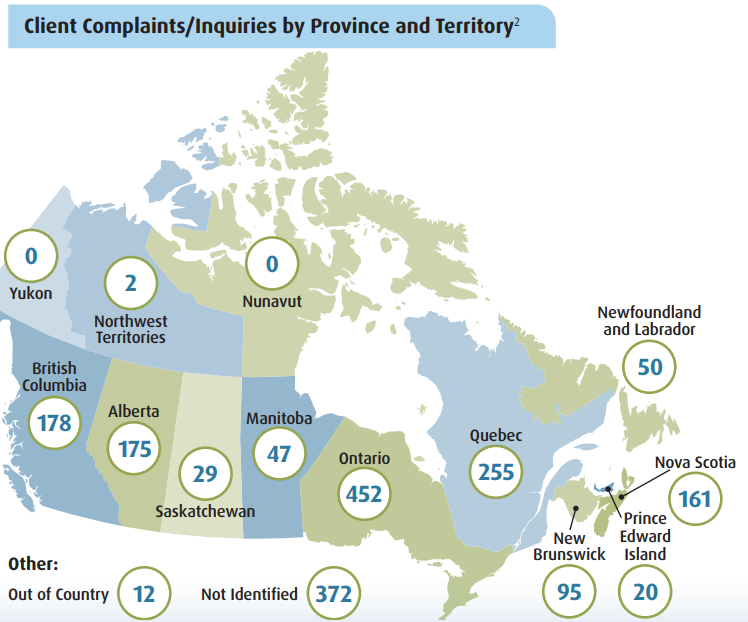
Alternative Text
In Canada:
Alberta – 175
BC – 178
MB – 47
NB – 95
NL – 50
NS – 161
ON – 452
PE – 20
QC – 255
SK – 29
YT – 0
NT – 2
NU – 0
Other:
Out of Country – 12
Not identified – 372
How Our Clients Contacted Us
Alternative Text
Phone - 4769
Online Form - 916
Email - 2217
Other - 51
Total Incoming Contacts - 7953
The number of incoming contacts only counts incoming and is not reflective of all our outgoing calls, emails, etc.
Complaints by Client Category Footnote 3
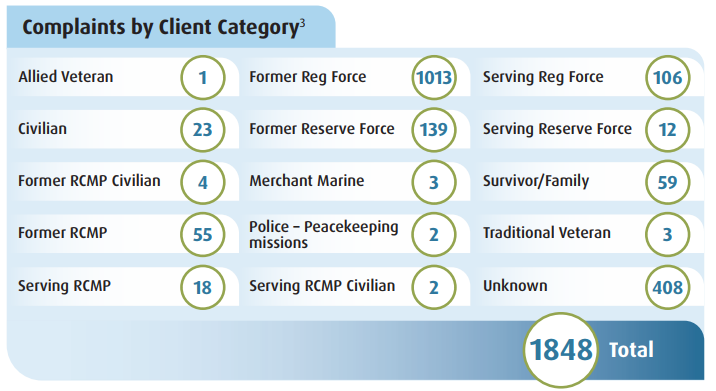
Alternative Text
Allied Veteran – 1
Civilian – 23
Former RCMP Civilian – 4
Former RCMP – 55
Serving RCMP – 18
Former Reg Force – 1013
Former Reserve Force – 139
Merchant Marine – 3
Police - Peace keeping missions - 2
Serving RCMP Civilian - 2
Serving Reg Force – 106
Serving Reserve Force – 12
Survivor/Family – 59
Traditional Veteran – 3
Unknown – 408
Clients by Age Footnote 4
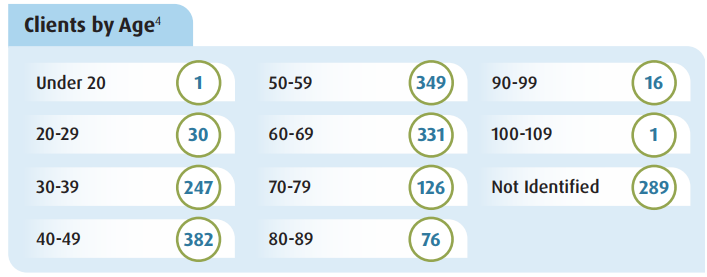
Alternative Text
Under 20 - 1
20-29 – 30
30-39 – 247
40-49 – 382
50-59 – 349
60-69 –331
70-79 – 126
80-89 – 76
90-99 – 16
100-109 – 1
Not identified – 289
Clients by Gender Footnote 5
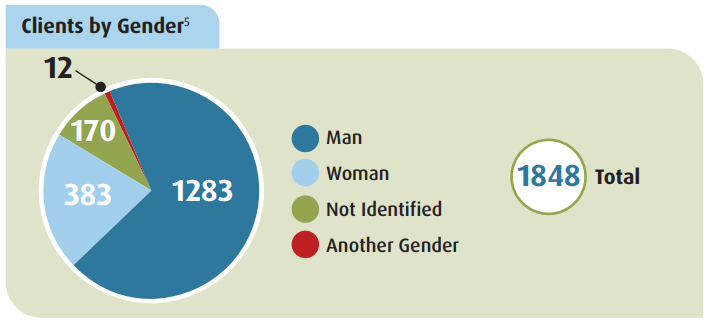
Alternative Text
Another Gender – 12
Man – 1283
Woman – 383
Not Identified – 170
Preferred Language Footnote 6
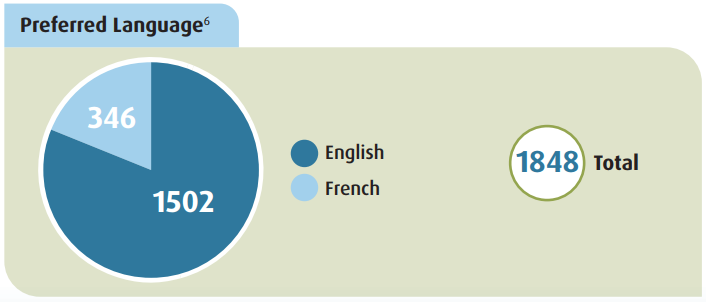
Alternative Text
English – 1502
French – 4346
Delayed Decision: Deceased Veteran’s Family Finally Receives The Disability Compensation That The Veteran was Entitled To Footnote 7
ISSUE: A 91-year-old widowed Veteran received a favourable Pain and Suffering Compensation (PSC) decision upon appeal to the Veterans Review and Appeal Board. However, the Veteran passed away just three days after receiving the PSC notice from Veterans Affairs Canada (VAC) and did not have the opportunity to elect the lump sum instead of the default monthly payment of the benefit. VAC initially refused to pay the more than $75,000 balance to the Veteran’s estate because the Veteran died prior to electing the lump sum, and lump sum payments in these circumstances are only payable to a spouse or dependent child.
ACTION: The Office of the Veterans Ombud (OVO) determined that the outcome was unfair. Specifically, despite the Veteran’s age and rapidly declining health, which the daughter had informed VAC about on several occasions, VAC failed to fast track the decision even though the Veteran qualified as a “Red Zone” applicant; “Red Zone” is for Veterans who are medically at risk, palliative, or over 80 years old. Additionally, the favourable PSC decision letter did not include the lump sum election form that is standard practice for Red Zone applicants.
At the request of the OVO, VAC reviewed the file and confirmed that there had been an administrative error in this particular case. VAC subsequently notified the Veteran’s estate of the error and authorized the lump sum payment.
RESULT: VAC issued the PSC lump sum to the Veteran’s estate in full.
Survivor Receives Benefits After Error Corrected Footnote 8
ISSUE: A Veteran’s surviving spouse contacted us after having trouble getting survivor benefits. When the Veteran passed away in 2022, VAC asked the surviving spouse to sign a form confirming a common-law relationship. But they weren’t common-law—they were married. At the time of the Veteran’s passing, they had been temporarily living apart for work reasons, but there was no separation in a legal sense. The surviving spouse’s lawyer advised against signing the form because it was inaccurate. The marriage certificate and the Veteran’s Last Will and Testament, both in VAC’s possession, clearly showed they were married. Feeling frustrated and unsure of what to do, the surviving spouse turned to the OVO for help.
ACTION: The OVO contacted VAC to confirm the surviving spouse’s status and directed VAC to the marriage certificate and the Veteran’s Last Will and Testament on file. VAC agreed that an error had been made.
RESULT: VAC approved back payments for the survivor. They also set up monthly payments going forward. After a long wait, the surviving spouse finally received the support they were entitled to.
To read more about how we’ve made a difference in the lives of Veterans and their families, visit the Featured Cases section on our website.
SHARING, LISTENING AND CONNECTING
Connecting with Canada’s Veterans, their families, and other stakeholders continues to be essential in maintaining our awareness of issues affecting the Veteran community.
In the past year we have met with Veterans and stakeholders, and conducted town halls in Prince Edward Island, New Brunswick, Ontario, Manitoba, and Saskatchewan, as well as extended our outreach to online communities. All across the country, we heard similar concerns. The main one is access to family doctors and/or specialists, with the result that there are Veterans who cannot get prescriptions filled, or treatment benefits, or even complete their disability claims.
We also heard from families about how dealing with VAC while taking care of their Veteran family member is taking a toll on their own mental health. The chronic shortage of community mental health support often means that family members are going untreated. There continues to be a pressing need for additional mental health support for families.
The OVO has also taken the opportunity to conduct visits to Canadian Armed Forces (CAF) Bases and Wings to meet with CAF senior leaders, Military Family Resource Centres, Transition Centres, and to talk with CAF members. We heard about issues related to transitioning out of the CAF, and how those issues affect Veterans and their families. Throughout our outreach engagements, we aimed to not only hear about issues affecting Veterans and their families, but also raise awareness of the OVO’s mandate and services and how we support Veterans and their families.
The OVO is grateful to the Veteran community for taking the time to meet with us over the past year, share their concerns, and help us learn what is affecting them.
2024-2025 Outreach Activities Footnote 9
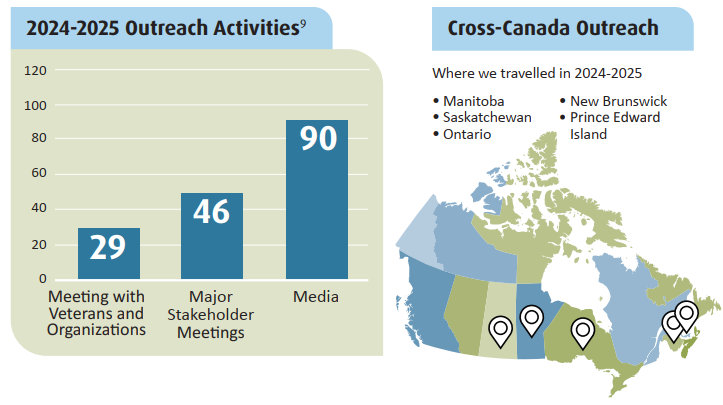
Alternative Text
Meeting with Veterans and Organizations - 29
Major Stakeholder Meetings - 46
Media - 90
Cross-Canada Outreach - Where we travelled in 2024-2025 (Mantitoba, Saskatchewan, Ontario, New Brunswick, Prince Edward Island)
Website
In 2024-2025 we had 36,913 visitors to our website. Visitors came from around the world and every Canadian province and territory. The highest web traffic originated from Ontario, Alberta, British Columbia, Prince Edward Island, and Nova Scotia, respectively. Most of the visits to our website are on the English pages, with about 10% accessing the French pages. This is in keeping with our client demographics.

Alternative Text
Web Users by Language
English - 32,638
French - 3752
Chinese - 218
Spanish - 89
Other - 216
Total - 36,913
Web Visitors by Country
Canada - 29,977
United States - 4314
China - 310
France - 159
United Kingdom - 156
Other - 2097
Total - 36,913
SOCIAL MEDIA Footnote 10

Alternative Text
Total followers - Facebook (7,659) Instagram (2,747) X (3,289)
Page and profile reach - Facebook (256,188) Instagram (14,954) X (unknown)
Post reach - Facebook (263,676) Instagram (19,069) X (unknown)
REPORTS, RECOMMENDATIONS, AND RESOURCES
In 2024-25 our Strategic Review and Analysis team continued its work to identify systemic unfairness in VAC programs and services. Where we found systemic unfairness, we made recommendations to resolve it. We also continued to press the Department to implement our outstanding recommendations. This year, in addition to our annual Spotlight publication tracking the implementation status of our systemic recommendations, we published one systemic report and made two new recommendations.
ADDITIONAL DEPENDANT CARE REIMBURSEMENT UNDER THE VETERANS AFFAIRS CANADA REHABILITATION PROGRAM Footnote 11
After receiving a complaint from a Veteran that raised concerns about the rules that govern how and to what extent the Department can cover Veterans’ dependant care costs through the Rehabilitation program, we reviewed the program’s Additional Dependant Care reimbursement provisions. We found two fairness issues with the regulations that apply to the maximum rates:
First, there is a lack of authority to exceed the maximum rate for additional dependant care for clients attending rehabilitation services other than training regardless of their circumstances; and second, the maximum rates which were set out in the regulations in 2006, may not have kept up with the cost of dependant care.
To address this unfairness, we made the following recommendations to the Minister of Veterans Affairs:
Recommendation 1: Amend the Veterans Well-being Regulations to include discretion to exceed the maximum rate when circumstances warrant for Additional Dependant Care for clients attending rehabilitation services other than training.
Recommendation 2: Ensure that the regulatory provisions for Additional Dependant Care maximum rates do not result in clients bearing more of the cost of Additional Dependant Care over time.
2024 SPOTLIGHT Footnote 12
Spotlight 2024 continued our annual practice, since 2017, of tracking the Department’s progress toward implementing our systemic recommendations.
This year, the Spotlight introduced two new elements. We included a new category, “In Progress,” to describe the implementation status of recommendations where VAC has begun but not finalized work to address the unfairness. And because we know that implementation takes time, we instituted a one-year delay before tracking new recommendations unless we can show progress. We also continued the practice, introduced in 2023, of reporting on whether VAC accepts each outstanding recommendation.
Spotlight 2024 highlighted progress that the Department has made, including advancing gender equity in certain areas of disability benefit adjudication, while also emphasizing a number of outstanding recommendations that require action. We noted the continued need for VAC to address our 2021 recommendation to provide mental health treatment benefits for family members in their own right, when their mental health has been impacted by their family member’s service.
What to Expect When You Contact Our Office Footnote 13
Our primary role is to assess the fairness in the delivery of programs and services offered by VAC. This resource is designed to help Veterans and their families understand the process and what happens when they reach out to our office for assistance with a complaint.
VETERANS OMBUD ADVISORY COUNCIL
The Veterans Ombud Advisory Council (VOAC) provides valuable advice to the Veterans Ombud on matters related to the OVO’s mandate. The Council, through its broad range of diverse backgrounds, perspectives, and experience, brings a wide range of viewpoints from the Veteran Community to bear on topics of interest and concern. Through their expertise and knowledge, Council members help identify emerging issues and offer guidance on how to address them. In addition, VOAC members play a crucial role in raising awareness within the Veteran Community about the OVO and the important work we do.
Beth Basinger has been trained as a registered nurse and has been with her retired CAF spouse for 34 years through 11 postings and four deployments. They have moved their family to four provinces and one US State throughout his military career. She has actively supported military families at each posting and has been involved with both Military Family Services (MFC) and the Military Family Resource Centres (MFRC).
Jane Hall (née Greenwood) was born in Wolfe Island, Ontario and received a Bachelor of Arts and Bachelor of Education before joining the Royal Canadian Mounted Police (RCMP) where she served 21 years from 1977-1998. Post service she authored The Red Wall: A Woman in the RCMP. Jane has been a member of the RCMP Veterans Association since 1998 in addition to serving as co-chair of the Women in Leadership: Public Safety Leadership Development Consortium 2009-2013, Chair of the RCMP Veteran Women’s Council 2013-present, past president of Police Futurists International (PFI) 2018-19, a member of Women Veterans Research Network (WREN) 2019-present. She is currently a lecturer for the Law Enforcement Institute of Texas (LEMIT) program on Police Organizational Culture. Jane has been the recipient of the RCMP Long Service Medal (1997), Paul Harris Fellow for Humanitarian work with Rotary International, shortlisted for the Edna Stabler Award for Creative Non-Fiction, Sir Wilfrid Laurier University, 2025 recipient of the Minister of Veterans Affairs Commendation.
Wendy-Anne Jocko joined the Canadian Armed Forces in 1979 and served for 23 years. Throughout her career she served in Edmonton, Calgary, Chilliwack, Petawawa, and completed two tours in Bosnia and Croatia. Wendy-Anne is currently the Indigenous Liaison with Innovation7, and a committee member with the Assembly of First Nations Veterans Council. Prior to this she was the Chief of the Algonquins of Pikwakanagan First Nation, leading them through the COVID-19 pandemic and on to a Treaty and Self-Government.
Brigitte Laverdure, retired Airframe Technician, was born in Magog, Québec, and joined the Canadian Armed Forces in 1980. Medically released after 19 years of service, she and her spouse have been helping Veterans obtain benefits from Veterans Affairs Canada. Brigitte received a Veterans Ombud Commendation in 2020 for her work supporting and advocating for Veterans in the 2SLGBTQI+ community.
Jay Milne Major General John (Jay) Milne (retired), MSM, CD, served 38 years in the Canadian Armed Forces as a Signal Officer in the Regular Force and as an Armoured Officer in the Primary Reserve. He has commanded the troop, squadron, unit, and brigade levels, and has served in different capacities at the National Defence Headquarters (NDHQ). Before releasing in 2018, he served as special advisor to the Deputy Minister of Veterans Affairs.
Fern Taillefer began his military journey as an Army Cadet with the 204 Algonquin Cadet Corps in North Bay, Ontario, where he spent four years, attaining the rank of Regimental Sergeant Major. Fern served in the Canadian Armed Forces from 1974 to 1996, and since his retirement, he has dedicated his life to serving those who served. In 2022, Fern received a Veterans Ombud Commendation for his longstanding commitment to Veterans.
Stephen Walker Staff Sergeant Stephen Walker (retired) served 31 years in the Royal Canadian Mounted Police (RCMP). Throughout his career, he served in the Province of Manitoba as a police officer in rural and Indigenous communities. He was posted to Detachments, Major Crime, Organized Crime units and was a Staff Relations Representative for the RCMP in Manitoba. He has also served on various committees and boards of directors during and since his service with the RCMP.
The annual Commendations honour outstanding individuals and groups who demonstrate their commitment to the Veteran community through their selfless, hard work. Recipients are nominated by their peers for their exceptional contributions and dedication to improving the lives of Veterans and their families.
Lifetime Contribution
Robert Hemlow
Ron Mostrey
Individual Contribution
Amanda Anderson
Matthew Anders
Ian Edward Atkins
Ed Miller
Darren Reid
Local Organization
Can Praxis
National Organization
Team Rubicon
By October 2025, the OVO will have visited every major CAF Base/Wing in Canada and met with hundreds of Veterans and their families, as well as with many organizations committed to Veteran well-being. Our intent was to raise awareness of the services provided by the OVO and to hear directly from the Veteran community about their concerns and issues.
As well, we expect to publish a systemic report and recommendations on the VAC internal review process. Our resource guides have proved helpful to many and we will continue to offer tailored infographics on subjects that are often confusing.
Finally, preparations are well underway for the 2025 Veterans Ombud Commendations which will be awarded in November during a virtual ceremony.